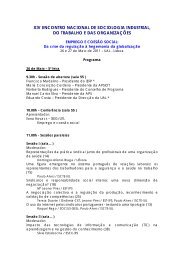Web-based Learning Solutions for Communities of Practice
Web-based Learning Solutions for Communities of Practice
Web-based Learning Solutions for Communities of Practice
You also want an ePaper? Increase the reach of your titles
YUMPU automatically turns print PDFs into web optimized ePapers that Google loves.
328<br />
Conditions and Key Success Factors <strong>for</strong> the Management <strong>of</strong> <strong>Communities</strong> <strong>of</strong> <strong>Practice</strong><br />
Mutch, A. (2003). <strong>Communities</strong> <strong>of</strong> practice and<br />
habitus: A critique. Organization Studies, 24(3),<br />
383-401.<br />
Roberts, J. (2006). Limits <strong>of</strong> communities <strong>of</strong><br />
practice. Journal <strong>of</strong> Management Studies, 43(3),<br />
623-639.<br />
Saint-Onge, H., & Wallace, D. (2003). Leveraging<br />
communities <strong>of</strong> practice <strong>for</strong> strategic advance.<br />
Butterworth & Heinemann, USA.<br />
Sandrock, J., & Tobin, P. (2007). Critical success<br />
factors <strong>for</strong> communities <strong>of</strong> practice in a global<br />
mining company. Nr Reading, Academic Conferences<br />
Ltd.<br />
Schewen, T. M. & Hara, N. (2003). Community <strong>of</strong><br />
practice: A metaphor <strong>for</strong> online design? In<strong>for</strong>mation<br />
Society, 19(3), 257-271.<br />
Smeds, R., & Alvesalo, J. (2003). Global business<br />
process development in a virtual community <strong>of</strong><br />
practice. Production Planning & Control, 14(4),<br />
361-372.<br />
Soto, J. P., Vizcaino, A., Portillo-Rodriguez, J.,<br />
& Piattini, M. (2007). Applying trust, reputation<br />
and intuition aspects to support virtual communities<br />
<strong>of</strong> practice. In Knowledge-Based Intelligent<br />
In<strong>for</strong>mation and Engineering Systems: Kes 2007<br />
- Wirn 2007, Pt Ii, Proceedings, (pp. 353-360).<br />
Swan, J. A., Scarbrough, H., & Robertson, M.<br />
(2002). The construction <strong>of</strong> communities <strong>of</strong> practice<br />
in the management <strong>of</strong> innovation. Management<br />
<strong>Learning</strong>, 33(4), 477-497.<br />
Thompson, M. (2005). Structural and epistemic<br />
parameters in communities <strong>of</strong> practices. Organizational<br />
Science, 16(2), 151-164.<br />
Urquhart, C., Yeoman, A., & Sharp, S. (2002).<br />
NeLH communities <strong>of</strong> practice evaluation report.<br />
University <strong>of</strong> Wales Aberystwyth, England.<br />
Van Zolinger, S. L., Sreumer, J. N., & Stooker,<br />
M. (2001). Problems in knowledge management:<br />
A case study <strong>of</strong> a knowledge-intensive company.<br />
International Journal <strong>of</strong> Training & Development,<br />
5(3), 168-185.<br />
Venters, W., & Wood, B. (2007). Degenerative<br />
structures that inhibit the emergence <strong>of</strong> communities<br />
<strong>of</strong> practice: A case study <strong>of</strong> knowledge<br />
management in the British Council. In<strong>for</strong>mation<br />
Systems Journal, 17(4), 349-368.<br />
Wenger, E., McDermott, R., & Snyder, W. M.<br />
(2002). Cultivating communities <strong>of</strong> practice.<br />
Boston: Harvard Business School.<br />
Wenger, E., & Snyder, W. M. (2000). <strong>Communities</strong><br />
<strong>of</strong> practice: The organizational frontier. Harvard<br />
Business Review, 78(1), 139-146.<br />
Wenger, E. (1998). <strong>Communities</strong> <strong>of</strong> practice:<br />
<strong>Learning</strong>, meaning and identity. Boston: Cambridge<br />
University Press.<br />
Wenger, E. (1998b). <strong>Communities</strong> <strong>of</strong> practice:<br />
<strong>Learning</strong> as a social system. Systems Thinker.<br />
Wisker, G., Robinson, G., et al. (2007). Postgraduate<br />
research success: <strong>Communities</strong> <strong>of</strong> practice<br />
involving cohorts, guardian supervisors and<br />
online communities. Innovations in Education<br />
and Teaching International, 44, 301-320.<br />
KEY TERMS<br />
Case Studies: A detailed intensive study <strong>of</strong> a<br />
unit, such as a corporation or a corporate division<br />
that stresses factors contributing to its success<br />
or failure.<br />
<strong>Communities</strong> <strong>of</strong> <strong>Practice</strong>: An active system<br />
in which its participants share knowledge <strong>based</strong><br />
on their daily tasks. They share the meaning <strong>of</strong><br />
this knowledge in their life within the community.<br />
The participants <strong>of</strong> the community are united in<br />
the community’s practice and in the meaning <strong>of</strong><br />
said practice, both at the community level and at<br />
broader levels (Wenger, 1998).



